SUMMARY
This is AI generated summarization, which may have errors. For context, always refer to the full article.
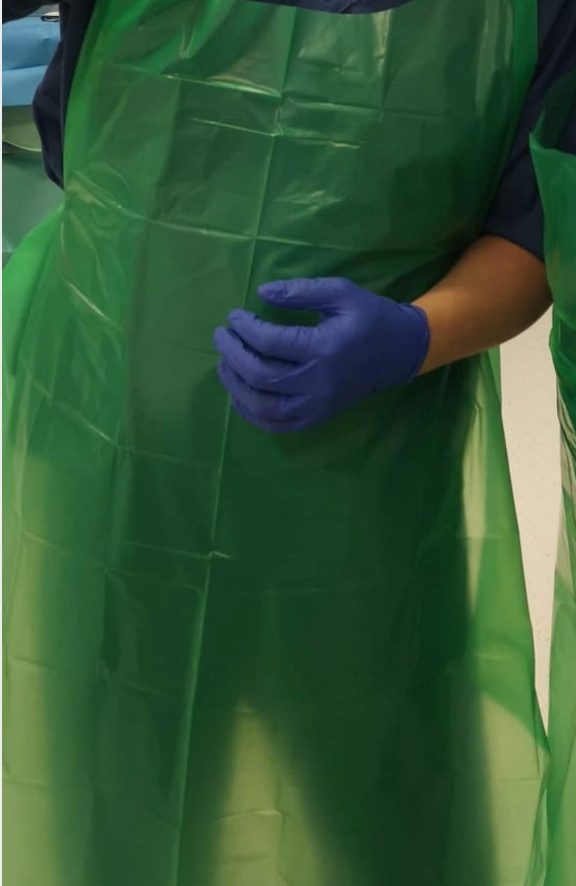
ARIZONA, United States (2nd UPDATE) – Amid an uncharted reality and uncertain future, Filipino nurses continue to serve in the United Kingdom’s frontlines against the novel coronavirus.
Jason Blando, 34, and his wife are both nurses at the state-run Royal United Hospitals in Bath, England. He is a charge nurse for critical care – equivalent to the Philippines’ Intensive Care Unit (ICU) – monitoring coronavirus patients, while his wife works in the emergency department.
On top of fighting an unseen enemy, nurses like them and other health workers have to contend with inadequate battle gear and an ever changing set of government guidelines.
Britain has nearly 80,000 coronavirus cases and more than 10,000 reported deaths. As of March 2019, Filipinos account for nearly 20,000 of the staff of the National Health Service, UK’s healthcare system. Filipinos rank third following British and Indian staff.
“Over all, there is anxiety among nurses. As a nurse, you have it in your psyche to take care of your patients and their well-being, but you also have a family. And also, the guidelines keep on changing. There’s confusion and miscommunication. So every day is a learning process,” Blando told Rappler in a video interview.
Janine Cruz (not her real name)*, 33, works at a private hospital near London. But due to the surge in cases of COVID-19, the government tapped private and independent hospitals for additional equipment and manpower.
Currently, she is tasked to care for patients with urgent needs such as trauma. But this does not mean she and her colleagues are already free from danger.
“Everybody knows someone can be asymptomatic but be a carrier of the virus. The patient might not have had contact with anybody who has the coronavirus, doesn’t have any symptoms, but is a silent carrier. Mahirap, every day talagang prayers. Hindi namin makita ‘yung kalaban namin.” (It’s tough. Every day, it’s really prayers. We can’t see our enemy.)
She said the UK army has started getting their hospital’s equipment – a glimpse into their new reality.
“Technically, we are now under NHS, that means they already have a right to our facilities. The Army has already started to collect our machines. That’s when we really felt this is becoming real: bigger hospitals that are now COVID-19 centers are needing more equipment. Soon, they would take all our machines. Next, they will redeploy the staff. It’s very unsettling, to be honest, because you cannot predict what’s going to happen next.”
“There’s already a sense of panic. You have to be cautious with some of your colleagues because they are already panicking. They have children, elderly parents.”
Both Blando and Cruz have been working in the UK for 7 years now and are already residents. When news of the outbreak came out, Cruz said she felt confident that the UK would be able to manage it well.
“Confident ako noong una kasi (I was confident at first because) we had the lead time, with Italy and Spain. But then we were surprised. Despite what happened to other European countries, the UK is still not that prepared for this.”
This scenario, however, is not unique to the UK. Other developed nations, like the United States, are also grappling with the pandemic.
PPE problems, health workers’ deaths
The lack of personal protective equipment (PPE) is a global concern shared by UK health care workers.
Public Health England (PHE), under the Department of Health and Social Care, initially advised the use of a thin plastic apron that barely covers the whole body. This is contrary to the World Health Organization’s advice to wear long-sleeved gowns. There is also a shortage in mask supply.
“To be honest parang nagkagulatan na ‘Ay kailangan na pala ng PPE’ (it seems everyone was caught by surprise that we now need PPEs). The guidelines they published were not really enough, not at par with that of the WHO. It really bothered us that we are not that protected. We were just given simple masks, the apron, the gloves. That’s it,” Cruz said.
“Some of the masks given to us were already expired. But there was no other choice – either that or no mask at all.”
Just recently, in early April, PHE released new guidelines that require health workers to wear long-sleeved gowns and full PPEs.
Rodnie Oro, 35, a nurse at the public St Bartholomews Hospital in London, said they all saw how China and Italy provided full PPEs to their healthcare workers. Even then, he said, it was not enough to protect them.
“Most of us are worried because of the PPE we were using for the longest time…. Seeing all the quality of PPEs in China and Italy. It’s like they were astronauts. Here in the UK, we only wear plastic aprons. It’s scary, especially you see a lot of news about the deaths of healthcare professionals in Italy. You’re worried for yourself and family,” Oro said.
Experts and medics also had qualms about the government’s initial, and highly controversial, strategy to allow the virus to spread to build up the population’s herd immunity.
“At first the government was leaning towards the principle of herd immunity and we’re not happy with that. Seeing from Italy and Spain, it does not work especially walang (there’s no) vaccine. We worried about that,” Oro said.
On top of this, they said there is still no blanket testing for all NHS staff, which could help determine who might already have – or had – the virus.
For some of them, acquiring the virus is no longer a question of if, but of when.
“My husband and I have this conversation that we have to be open to the possibility of contracting this disease no matter how good we are in terms of infection and prevention practices. Because you wouldn’t know who got it. We’re all gonna get it. We’re just praying that we’ll have minor symptoms and that nothing bad will happen to us,” Cruz said.
Family and home
Many, if not all, Filipino nurses who work abroad support their families back home. This, they said, is one of their daily worries in the time of the pandemic. (READ: [OPINION] The state of Filipino nurses, before and during the coronavirus)
“I support my parents back home. Thankfully they’re okay. That’s why you’re worried, you do not want to acquire the virus because your family is depending on you, on your support. It’s scary,” Oro said.
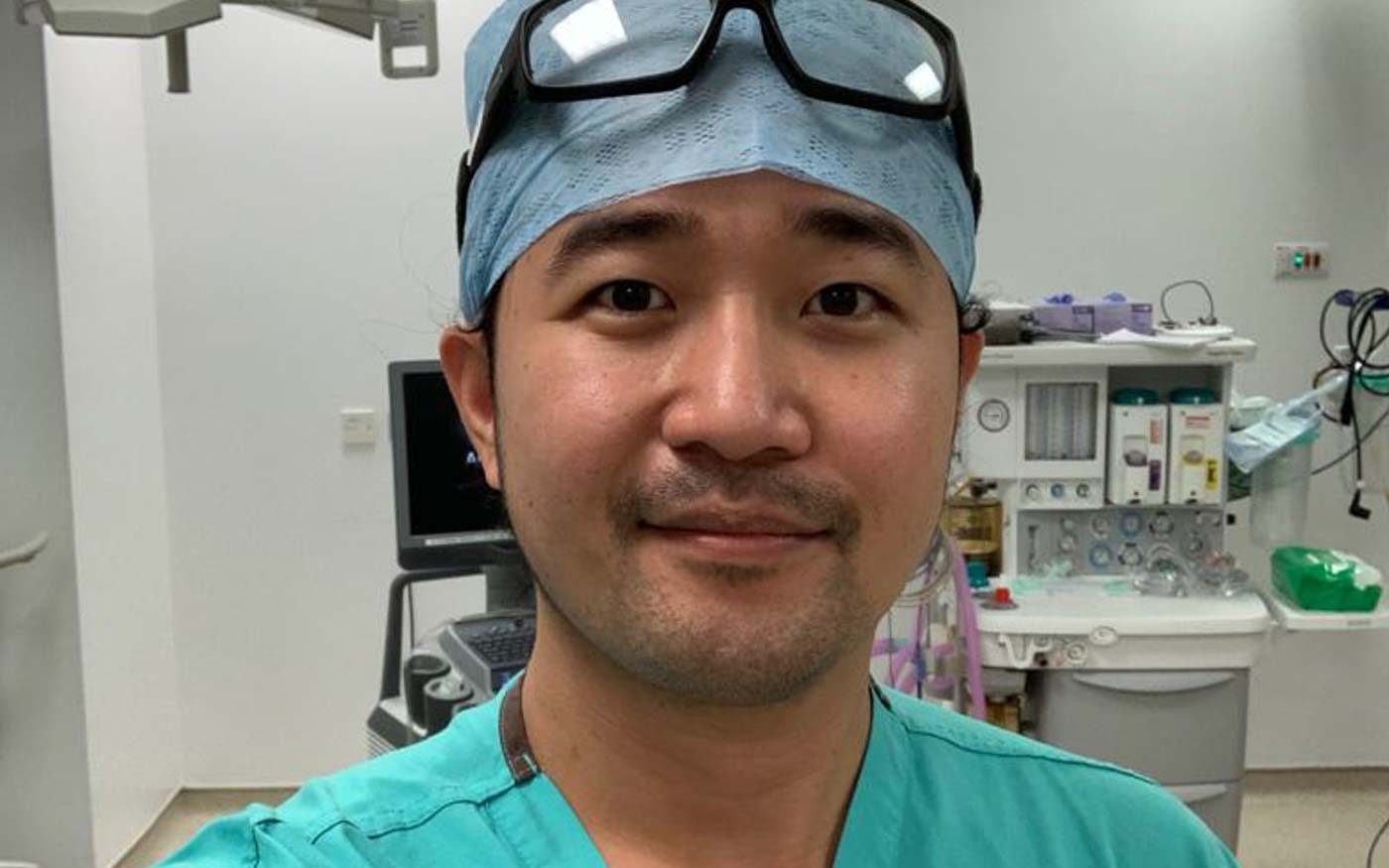
He added: “Every day we message each other. My communication with them is very important. Even if I’m exhausted from work, it’s good that I get to talk to someone about my frustrations.”
Blando and his wife left their 2-year-old toddler in Iloilo City. They have not seen their son for over a year. They were supposed to bring him to the UK but the plan had to be shelved due to the pandemic.
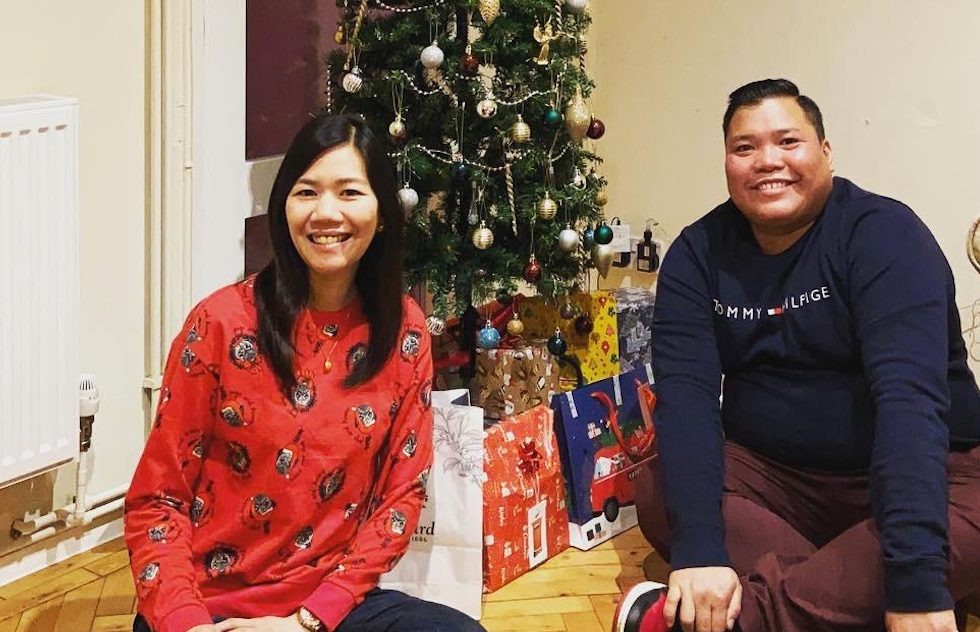
“For my wife, I know it’s mother’s instinct to think about her son. I know silently she dreads going to work for sure. I feel for her, I really feel sorry,” he said.
“I have those fears of ‘what if,’ what if something happens. But I just try to take things one day at a time, I just don’t put too much thoughts on those things I cannot control.”
As for the things they have control over, Blando said they make sure they take care of themselves after work.
“We don’t wear uniforms to and from work. The scrubs are left in the hospital, we shower the moment we arrive home. Those little things.”
“We just make sure we do the best we can to keep ourselves safe. My wife and I said – no heroics, do your work as best as you can to save people. But you also have to make sure you look after yourself. We have a son, we have families, we have our own lives to live.”
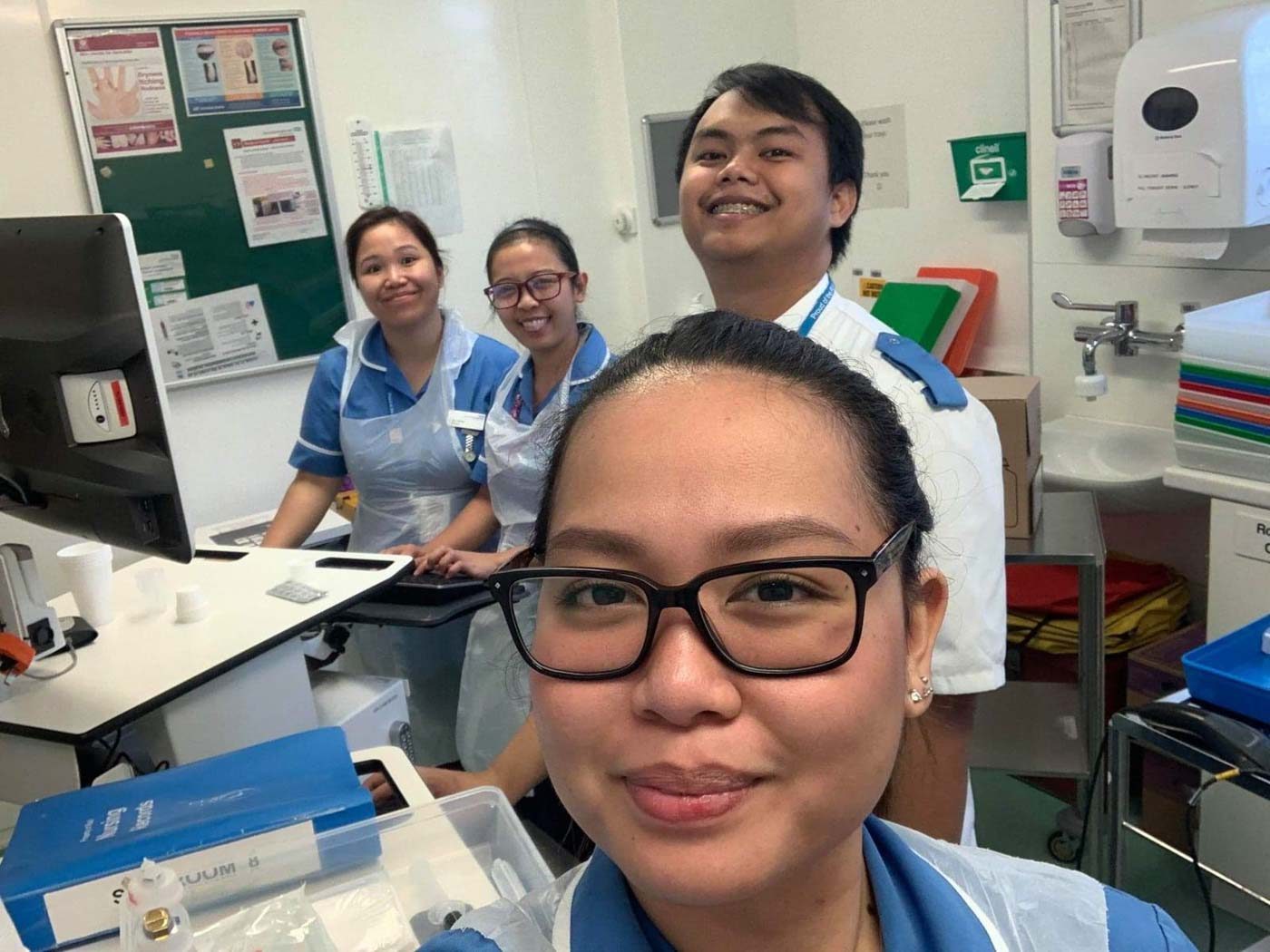
Filipino nurses, Cruz said, have no qualms working in difficult situations. After all, she said the Philippines trained them exactly for that. It is, however, different when health care workers are not protected enough to protect their patients.
“Halos lahat ng kakilala kong Pinoy willing sila, hindi mo kailangang pilitin pa o isa-isahin to care for these patients. Yung training namin sa Pilipinas we’re made to last under strenuous conditions. We’re used to working long hours, not eating, not having any breaks, not having toilet breaks. But we also have families waiting for us. It would be good if we would be given a chance to be protected against the virus, so that we can care for more patients.”
(Almost all Filipino nurses I know are willing to care for these patients. You don’t have to force them or ask them one by one. Our training in the Philippines made sure we can last under strenuous conditions.)
Hope and appreciation
Not all hope is lost. Blando, Oro, and Cruz look forward to a coronavirus-free future, wherein they could enjoy the lives they used to live.
“Seeing all the health staff work tirelessly, that really motivates me We now have one big community of healthcare workers. We rely on and we motivate each other. And then also in Italy, we see that their cases are declining. This makes me think that there is an ending to this crisis. Although for us here, we have yet to reach our peak,” Oro said.
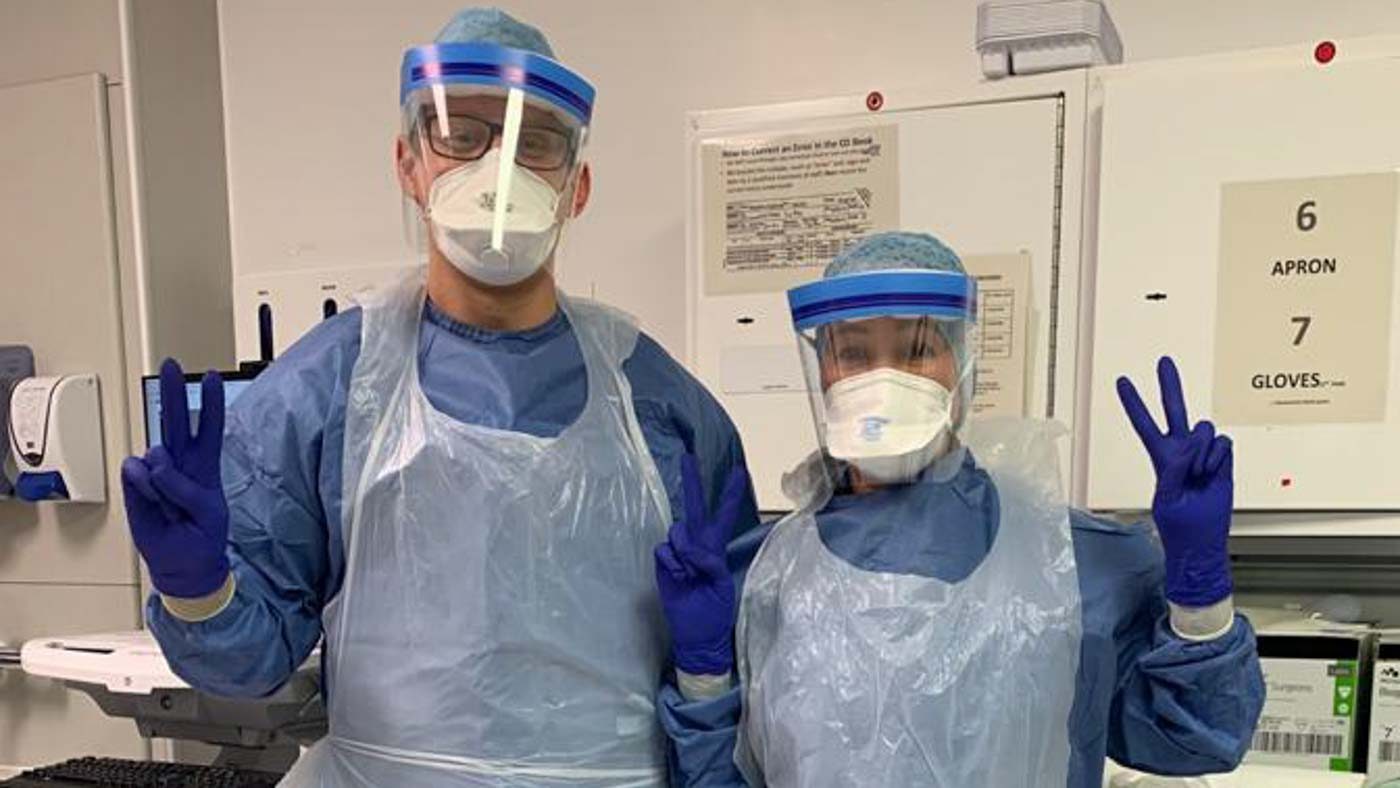
All three also look to their patients for hope and inspiration.
“When our patients in critical care get cured, you feel proud. it’s more of a feeling that ‘hey there’s proof that things could get better,’” Blando said.
“Seeing other patients who survived this is a sign of hope. It feels good to see them happy that they made it. It also feels good when they say thank you to the medics who took care of them,” Oro said.
Healthcare staff and other key workers during the crisis are also getting a moral boost from the UK public.
Households would gather on balconies and doorsteps to pay tribute to them by clapping – with some using pans, pots, and other items in the house, as can be seen in the video below.
Filipinos, in particular, also received a shout out from broadcaster Piers Morgan, who called them “unsung heroes” for “saving” people’s lives.
“Amazing number of Filipinos working in NHS are unsung heroes…. Thank you to all the Filipinos who are here, doing all this amazing work, and to every other immigrant working in the NHS currently,” Morgan said in his show, Good Morning Britain.
“And I hope at the end of this, we have a different sentiment, a different feeling about what immigration has done for this country.”
‘It’s worth bearing in mind when we talk about immigrants in this country, these are the immigrants currently saving people’s lives. Coming here and actually enriching our country and doing an amazing job’ – @piersmorgan pic.twitter.com/dAYcH9t095
— Good Morning Britain (@GMB) April 7, 2020
The nurses could not help but express pride in being Filipinos.
“Nakaka-proud. All along we are doing a great job overall… It is very heartwarming for someone recognized by the UK public to give us that kind of appreciation. For any health worker struggling to make sense of this all, it gives them a boost to sort of go on and do your job,” Blando said.
“I was happy to see that. I’m happy to see Filipinos are being recognized on national television. Because although we go here to work and provide for our families back home, for us it’s still service to the people,” Oro said.
In a post-COVID-19 world, Blando and his wife plan to take a vacation in the Philippines to finally see their son. Oro wants to continue taking videos and traveling with his fiancé. As for Cruz she said she chooses to look forward to a positive future.
“When all of this is over, we will all go back to our lives. I’m still optimistic that this, too, shall pass. But until then, we continue to wear our gowns and masks.” – Rappler.com
*Name was changed upon request
Add a comment
How does this make you feel?
There are no comments yet. Add your comment to start the conversation.